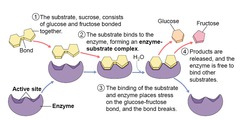| 2843822884 | What is an enzyme? | A protein that changes the rate of a chemical reaction. | 0 | |
| 2843822885 | How do enzymes speed up the rate of a reaction? | They speed metabolic reactions by LOWERING the activation energy to get that reaction going. | 1 | |
| 2843823589 | Why is shape so important for enzymes? What happens when an enzyme becomes denatured? | each enzyme needs to be the right shape for the job denature protein = unfold = lose shape | 2 | |
| 2843823590 | What is activation energy? | the minimum amount of energy needed to start a reaction | 3 | |
| 2843824986 | What is a substrate? | molecule the enzymes work on | 4 | |
| 2843825986 | What is an active site? | part of enzyme that substrate molecule fits into | 5 | |
| 2843825987 | What is the enzyme substrate complex? | when a substrate molecule interacts with the active site of an enzyme |  | 6 |
| 2843826955 | How many different types of enzymes can act on one type of substrate? Why? | One type. Enzymes are not changed by the reaction, they are used only temporarily and are re-used again for the same reaction with different molecules. | 7 | |
| 2843827580 | Catalytic cycle of an enzyme | A millisecond long cycle in which enzymes function by lowering activation energy and thereby speeding up reaction sand are not being used up in the process |  | 8 |
| 2843827581 | What is the effect of temperature and pH on enzyme activity? | Temperature - protein will denature (enzyme must be in the right shape. pH - Protein will denature; affects enzyme's proper shape | 9 | |
| 2843828518 | What is the optimal temperature for a typical human enzyme? Why does this temperature allow this enzyme to function? | 37°C This temperature allows for greatest number of collisions between enzyme & substrate | 10 | |
| 2843828519 | What is the optimal pH for pepsin? What about trypsin? Why is there a difference? | pepsin (stomach) = pH 3 trypsin (small intestines) = pH 8 Difference b/c it depends where in the body | 11 | |
| 2843829490 | What are enzyme inhibitors? | Inhibitors are chemicals that reduce the rate of enzymatic reactions They block the enzyme but they do not usually destroy it Many drugs and poisons are inhibitors of enzymes in the nervous system | 12 | |
| 2843829995 | Compare and contrast competitive inhibitors and noncompetitive inhibitors. | Competitive inhibitors bind to the active site of an enzyme, competing with the substrate Noncompetitive inhibitors bind to another part of an enzyme, changing the function | 13 | |
| 2843829996 | What is allosteric inhibition? | Changes active site to unreactive form; stops reaction | 14 | |
| 2843831256 | What is feedback inhibition? How does this work? Why would we not want an enzyme working in a pathway non-stop (unregulated)? Be familiar with the isoleucine pathway example from your text (page 132 figure 6.19) | When the product of a reaction near the end of a chain of reactions inhibits the function of an enzyme in an earlier reaction of the chain. The end products are controlling their own rate of production There is no build up of intermediates (B, C, D and E) | 15 |
AP Biology Enzymes Quiz Study Guide Flashcards
Primary tabs
Need Help?
We hope your visit has been a productive one. If you're having any problems, or would like to give some feedback, we'd love to hear from you.
For general help, questions, and suggestions, try our dedicated support forums.
If you need to contact the Course-Notes.Org web experience team, please use our contact form.
Need Notes?
While we strive to provide the most comprehensive notes for as many high school textbooks as possible, there are certainly going to be some that we miss. Drop us a note and let us know which textbooks you need. Be sure to include which edition of the textbook you are using! If we see enough demand, we'll do whatever we can to get those notes up on the site for you!

